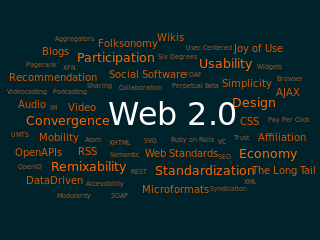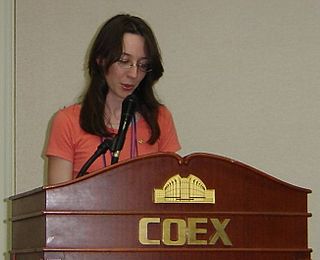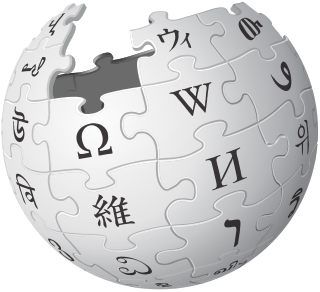Social software, also known as social apps, include communication and interactive tools often based on the Internet. Communication tools typically handle the capturing, storing and presentation of communication, usually written but increasingly including audio and video as well. Interactive tools handle mediated interactions between a pair or group of users. They focus on establishing and maintaining a connection among users, facilitating the mechanics of conversation and talk. Social software generally refers to software that makes collaborative behaviour, the organisation and moulding of communities, self-expression, social interaction and feedback possible for individuals. Another element of the existing definition of social software is that it allows for the structured mediation of opinion between people, in a centralized or self-regulating manner. The most improved area for social software is that Web 2.0 applications can all promote cooperation between people and the creation of online communities more than ever before.

Web 2.0 refers to websites that emphasize user-generated content, ease of use, participatory culture and interoperability for end users.
WPBT, virtual channel 2, is a Public Broadcasting Service (PBS) member television station licensed to Miami, Florida, United States. It serves as the flagship station of South Florida PBS, which also owns Boynton Beach-licensed fellow PBS member WXEL-TV and Miami-licensed Class A station WURH-CD. The three stations share transmitter facilities on Northwest 199th Street in Andover; WPBT's studios are located on Northeast 20th Avenue in North Miami. In addition to serving the Miami–Fort Lauderdale market, the station has significant viewership in much of the West Palm Beach market, and is the only Miami area television station to serve the entire South Florida metropolis.

Open educational resources (OER) are freely accessible, openly licensed instructional materials such as text, media, and other digital assets that are useful for teaching, learning, and assessing, as well as for research purposes.
A social networking service or SNS is an online platform which people use to build social networks or social relationships with other people who share similar personal or career content, interests, activities, backgrounds or real-life connections.
Social peer-to-peer processes are interactions with a peer-to-peer dynamic. These peers can be humans or computers. Peer-to-peer (P2P) is a term that originated from the popular concept of the P2P distributed computer application architecture which partitions tasks or workloads between peers. This application structure was popularized by file sharing systems like Napster, the first of its kind in the late 1990s.

Citizen media is content produced by private citizens who are not professional journalists. Citizen journalism, participatory media and democratic media are related principles.

User-generated content (UGC), alternatively known as user-created content (UCC), is any form of content, such as images, videos, text, and audio, that has been posted by users on online platforms such as social media and wikis. It is a product consumers create to disseminate information about online products or the firms that market them.
WXEL-TV, virtual channel 42, is a Public Broadcasting Service (PBS) member television station serving West Palm Beach, Florida, United States that is licensed to Boynton Beach. Owned by South Florida PBS, it is a sister station to Miami-licensed flagship and fellow PBS member WPBT and Miami-licensed Class A station WURH-CD. The three stations share transmitter facilities on Northwest 199th Street in Andover; WXEL's studios are located on South Congress Avenue in Boynton Beach.
Social media optimization (SMO) is the use of a number of outlets and communities to generate publicity to increase the awareness of a product, service brand or event. Types of social media involved include RSS feeds, social news, bookmarking sites, and social networking sites such as Facebook, Instagram, Twitter, video sharing websites, and blogging sites. SMO is similar to search engine optimization (SEO)in that the goal is to generate web traffic and increase awareness for a website. SMO's focal point is on gaining organic links to social media content. In contrast, SEO's core is about reaching the top of the search engine hierarchy. In general, social media optimization refers to optimizing a website and its content to encourage more users to use and share links to the website across social media and networking sites.
Content creation is the contribution of information to any media and most especially to digital media for an end-user/audience in specific contexts. Content is "something that is to be expressed through some medium, as speech, writing or any of various arts" for self-expression, distribution, marketing and/or publication. Typical forms of content creation include maintaining and updating web sites, blogging, article writing, photography, videography, online commentary, the maintenance of social media accounts, and editing and distribution of digital media. A Pew survey described content creation as the creation of "the material, people contribute to the online world."
OpenLearn is an educational website. It is the UK's Open University's contribution to the Open educational resources (OER) project and the home of free, open learning from The Open University. The original project was part-funded by the William and Flora Hewlett Foundation. OpenLearn is a member of the OpenCourseWare Consortium (OCWC).
Roblox is an online game platform and game creation system developed by Roblox Corporation that allows users to program games and play games created by other users. Created by David Baszucki and Erik Cassel in 2004 and released in 2006, the platform hosts user-created games of multiple genres coded in the programming language Lua. For most of Roblox's history, it was relatively small, both as a platform and a company. Roblox began to grow rapidly in the second half of the 2010s, and this growth has been accelerated by the COVID-19 pandemic.
Meedan is a global technology not-for-profit that builds software and programmatic initiatives to strengthen journalism, digital literacy, and accessibility of information. Meedan builds Check, an open-source software platform for fact-checking and content annotation and runs Health Desk, a service that brings together public health professionals to provide expertise and summaries of challenging public health concepts on-request for journalists, fact-checking organizations, and media outlets. Meedan also runs Check Global, a project to improve digital literacy, community-building and political engagement skills for citizen journalists, activists, journalism students, civil society organizations and human rights defenders and the Digital Health Lab, which focuses on applied research and policy for improving the quality and equity of online health information.
Heritage Key was a content-oriented online community aimed at those with an interest in history and culture. It featured both media resources and an interactive experience.

The Mandel Public Library of West Palm Beach is the public library of the City of West Palm Beach, Florida.
Shared historical authority is a current trend in museums and historical institutions which aims to open the interpretation of history to the public.

Wikipedia is a free, web-based, collaborative and multilingual encyclopedia website & project supported by the non-profit Wikimedia Foundation. It has more than 48 million articles written collaboratively by volunteers around the world. Almost all of its articles can be edited by anyone with access to the site, and it has about 100,000 regularly active contributors.
The digital commons are a form of commons involving the distribution and communal ownership of informational resources and technology. Resources are typically designed to be used by the community by which they are created.
Display Inc., stylized as display, is an online social media and networking service based in Norwalk, Connecticut. The display app officially launched in May 2021.





